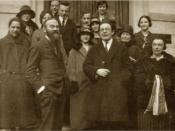In the study of learning, learning theories are categorized into paradigms or schools of thought based on viewpoints shared by scientists that provide a framework for research. Three of the major paradigms of learning theories include the cognitive paradigm, the neurophysiological paradigm and the evolutionary paradigm. The first paradigm is referred to as cognitive because theorists place their emphasis on the cognitive nature of learning. According to Hergenhahn and Olson (2005), the second paradigm is called neurophysiological because it attempts to isolate the mental and physiological correlates of things such as learning, perception, thinking and intelligence. The third paradigm is termed evolutionary because theorists attempt to explain learning processes based on an organism's evolutionary history.
DiscussionThere are several theorists whose ideas are predominately cognitive. Theses theorists include the Gestalt psychologists Kurt Lewin and Kurt Koffka, as well as Jean Piaget, Edward Chace Tolman, and Albert Bandura. Wertheimer, Kohler and Lewin were founders of the Gestalt movement.
According to Hergenhahn and Olson (2005), Gestalt theorists believed that "we experience the world in meaningful wholes and do not see isolated stimuli but stimuli gathered together into meaningful configurations" (p. 264). Kurt Lewin proposed a field theory of human motivation. He believed that behavior and cognitive processes are determined by various psychological facts that a person is consciously experiencing. The psychological facts are interdependent and any change in one can affect all the others, therefore influencing our behavior.
Kurt Koffka, another Gestaltist falling under the cognitive paradigm defined the law of Pragnanz in Gestalt Theory. The law of Pragnanz states that, "all mental events tend toward completeness, simplicity, and meaningfulness" (Hergenhahn and Olson, 2005, p. 473). Followers of Gestalt theory used this law as a guiding principle when studying learning.
Another cognitive theorist was Jean Piaget. Jean Piaget contributed several theories including...


